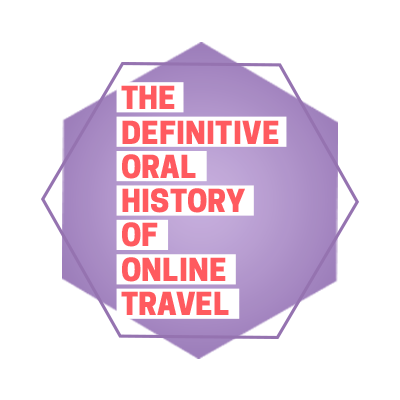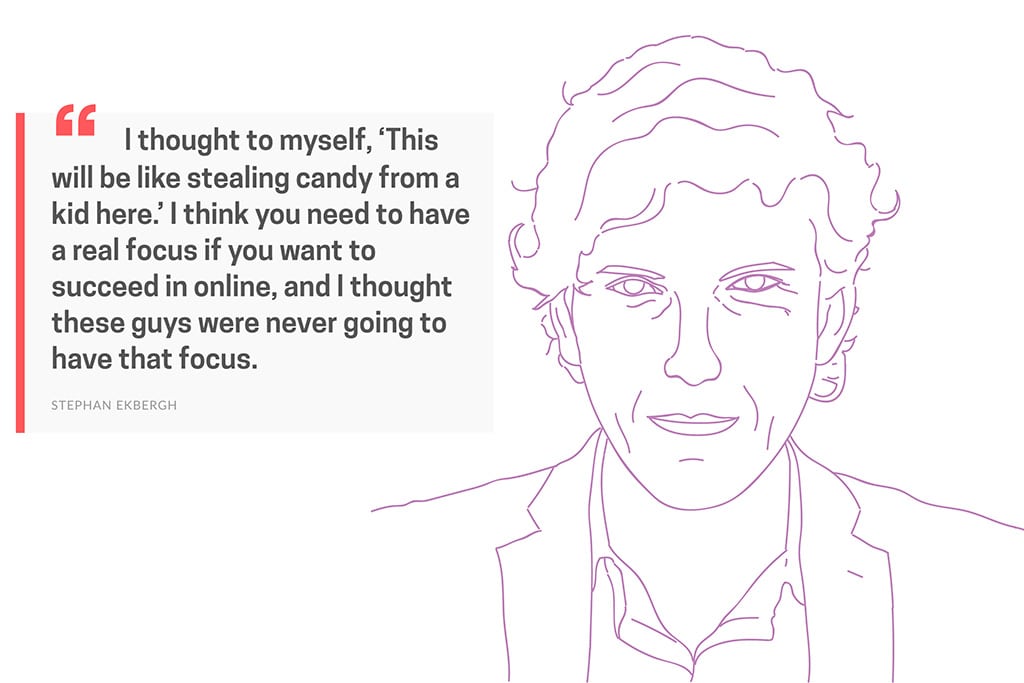Skift Take
Building up an affiliate network became a great marketing tool for Travelstart in South Africa a decade ago because print ads weren't effective. The incumbent competitors weren't particularly effective because they had no focus on e-commerce.
 Skift launched its largest and most ambitious project yet, The Definitive Oral History of Online Travel, on June 1.
Skift launched its largest and most ambitious project yet, The Definitive Oral History of Online Travel, on June 1.
In nearly 40,000 words founders, CEOs, other executives and insiders tell a story in their own words about the creation of Internet giants such as Expedia, Priceline, Travelocity, Orbitz, TripAdvisor and more.
Not all of the interviews fit into the big story so we are publishing standalone stories that offer deeper insight into information we collected during the three-month research process.
Stephan Ekbergh, who founded Travelstart in Sweden in 1999, got bored on vacation in South Africa in 2004. So he did what just about anyone would do when looking for fun on vacation — he phoned local global distribution system contacts and invited them to lunch.
Ekbergh learned about the state of the travel market there and found out that offline players were consolidating and there were a handful of online players, such as LastMinute.com and Kalahari.com, but none were really making a mark and successfully focusing on online travel.
“I thought to myself, ‘This will be like stealing candy from a kid here,’ Ekbergh says. “I think you need to have a real focus if you want to succeed in online, and I thought these guys were never going to have that focus. So I decided tthere and then on that vacation that we were going to set up shop in South Africa.”
He moved to South Africa in 2004 and started up Travelstart’s operations in Capetown in 2006. Ekbergh soon discovered that banks and airlines had little understanding of online payments or online travel agencies, respectively, and it was a struggle to find reliable Internet service providers.
As part of Skift’s The Definitive Oral History of Online Travel, we spoke to Ekbergh about the development of online travel in Africa and how Travelstart developed.
Skift: I was hoping you might be able to shed some light about what was going on before Travelstart got under way and how you guys started. Can you fill in some of the blanks?
Stephan Ekbergh: I started Travelstart in Sweden in ’99. We went here on vacation in 2004. I’d been in South Africa about 15 times or so since the ’80s so I knew it pretty well. We went on a mission to see if we could emigrate there. Actually, I wasn’t thinking about launching Travelstart in South Africa when we went there on vacation because I thought this isn’t going to go anywhere in a million years.
After about a week or so of vacation, I was really bored. So I started to call some of the GDSs [global distribution systems] and inviting them for lunch because, you know, there was nothing going on. And very quickly I realized that the whole industry was sleeping in South Africa; there wasn’t really an online space to talk about. I knew Lastminute.com very well because we had been working with them for a couple of years in Scandinavia. I knew them very well, and I knew who their country managers were in South Africa. I also knew that they had spent about $2 million trying to break into the mainstream here, but it was also a joint venture with one of the conglomerates. Travel.com.au also tried to break into the market through joint venture with one of the other conglomerates in the country, and they were literally doing nothing.
Skift: When you say conglomerates, do you mean travel agencies?
Ekbergh: One of the findings in my amateurish research down in South Africa in 2004 was that the GDSs said everything is consolidated here; there’s nothing more to do with the industry in this country. Basically both Tourvest and Bidvest, along with some other groups, had already bought a bunch of agencies so I’d say about four groupings had sort of cornered the market in South Africa. Then of course there was Flight Centre, which was a standalone.
I thought to myself, ‘This will be like stealing candy from a kid here.’ I think you need to have a real focus if you want to succeed in online, and I thought these guys were never going to have that focus. So I decided tthere and then on that vacation that we were going to set up shop in South Africa. That was the chain of events, basically. We moved here in 2004, but only got going in 2006 because we had so much to do on the home front in Scandinavia. We were very busy with that so we didn’t manage to set anything up until 2006.
In South Africa, there were a few companies [including traditional travel agencies] that offered off-the-shelf booking engines, but I didn’t really count that as any type of competition.
Read the Definitive Oral History of Online Travel
Read More
- The Definitive Oral History of Online Travel
- Launching Skift’s Biggest Project Yet: The Definitive Oral History of Online Travel
- The Never-Before-Disclosed Details About the Birth of Online Travel
- Skift Podcast: The Invention of Online Travel and How It Changed the Future of Travel Forever
- Oral History of Online Travel: Barry Diller’s Deals Built Travel Empire
- Oral History of Online Travel: Booking.com Succeeds Despite Doing It ‘Wrong’
- Oral History of Online Travel: Ctrip’s Different Path to China’s Consumers
- Oral History of Online Travel: How Hostelworld Backpacked Its Way to Success
Skift: The consumers weren’t gravitating towards it?
Ekbergh: No, apart from Kalahari.com, which in those days was the Amazon of South Africa, was around but also very weak. The service was weak, and the products were crappy. I just thought to myself that at some point something’s going to happen there.
And I could do this because I controlled my company. I did it because I thought it was fun. I also thought I’ve always had this love for Africa in general. So I thought at one point, everybody’s going to be buy their trips online here as well, so let’s see if we can have the patience enough until it happens.
Skift: Where were you born?
Ekbergh: I was born in Sweden.
Skift: But you just had a love for Africa?
Ekbergh: I came to Africa the first time in the ’80s. I’ve been working in travel most of my life so when the Internet started to happen in the mid-’90s, I of course knew that was going to be the future. So that’s why we started. Lo and behold, what I found out very early was that I could see different dynamics in Africa than what I saw in Europe, and I thought, ‘Man, here you can bring a lot of change to the consumers and to the suppliers, both with distributions and payment.’ Even up until very recently, most of the European airlines servicing out of South Africa, you could book online but you had to go to the airport to pay. That was only recently changed, you know! It’s so retarded in many of the countries here that there is a lot to do. You have to do a lot of heavy lifting.
Skift: For hotels, the same thing obviously.
Ekbergh: I’ll tell you what the problem with hotels is. Most of the hotels — if you take away the big chains (which there aren’t many) — they haven’t got any PMS [property management system]. They don’t have any proper technology to service that. There is a big, white, empty sheet in many cases. Of course the Hiltons, and all these guys have got it all covered. Booking and Expedia, they have them. I haven’t done any studies, but I would probably guess that at least 80 percent of the accommodations in Africa are not covered by these guys. They [hotels] have very crappy, if any, technology.
Skift: So Travelstart started with …
Ekbergh: We started with flights. We were the first ones to do that right; we had all the low cost carriers. You could pay anyway you want – cash, credit card or EFT [electronic funds transfer] or whatever. And then we bundled up with really focused and great service.
There were tons of challenges at first, of course. Talking to banks about accepting payments online was ridiculous. They literally had no idea what we were talking about. Getting ISPs [Internet Service Providers] that offered Internet that had uptime of over 70 percent was literally impossible. Internet was extremely expensive back then. It’s still expensive, but back then it was extremely expensive. Then getting airlines to understand what we were doing was virtually impossible. We had to scrape the airlines [their websites] because they didn’t have any APIs and they definitely didn’t want to work with an OTA if there was such a thing. We scraped them, and they tried to sue us, they tried to threaten us, and all kinds of things; that was of course a challenge.
Skift: What was your resolution to that?
Ekbergh: Sales figures are always a good resolution. We showed them that we could sell, and then they were quiet.
Skift: What were the challenges in getting consumer adoption?
Ekbergh: That wasn’t the problem at all. Actually, it took off literally immediately. The problem in the beginning was how to get to them because offline didn’t work well at all. We had to create an ecosystem of affiliates and train them how to make money. That took us a few months and then we got about 10 or 20 really good anchor affiliates that could start to drive a lot of traffic to us. They made a lot of money; some of them became really rich, actually. We did that really well.
AdWords in South Africa didn’t start until we had been here for awhile, and when we started that was also good because we were the first ones. We did that, and the others were so slow to get going there so that was a good channel. Email marketing was also fairly new at this stage and not done very properly.
Skift: How many employees do you have today?
Ekbergh: 200.
Skift: How many did you have when you started in 2006?
Ekbergh: There was me! I hired two people at first. Then we were six; then we were 10 so we grew from there.
The Daily Newsletter
Our daily coverage of the global travel industry. Written by editors and analysts from across Skift’s brands.
Have a confidential tip for Skift? Get in touch
Tags: ceo interviews, oral history, south africa
